By Julianna Peres, University of North Carolina at Charlotte
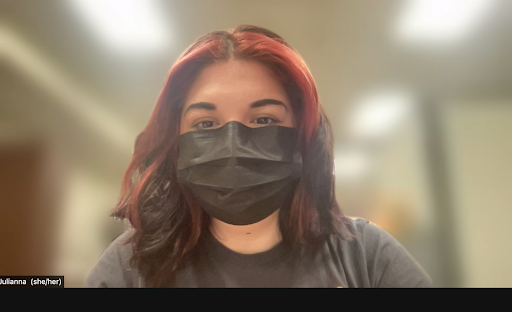
Hello, my name is Julianna and my pronouns are she, her, hers. That is the way that I try to introduce myself to each tutee and it is the way that I introduce myself to you.
Recently, there has been a surge of conversations about intersectionality and inclusivity in Writing Centers (WC) within university classrooms and WC settings. WC Directors and tutors have been facilitating conversations about accessibility for neurodivergent tutees and have been discussing the nuances of racial awareness and social justice work in the WC space. More and more centers are changing the physical, electronic, and intellectual aspects of tutoring sessions so as to create a more accessible atmosphere for both tutors and tutees. This is important work to be sure; however, one minoritized group that has hardly been mentioned in passing within this WC context is the LGBTQ community. A highly stigmatized subject, the comfort that LGBTQ tutors and tutees experience within the WC space is nonetheless an increasingly important one to examine, discuss, and embrace in all university and collegiate institutions.
Self-disclosure and the inclusion of conversations in relation to one’s intersectional identities and, in particular, one’s pronouns can act as a catalyst for mutual trust. In order to create these spaces, there is, undoubtedly, a need for vulnerability on the behalf of both tutors and tutees. Tutees should feel comfortable as writers in WCs, of course, but they should feel at ease in their own identities as individuals as well.
Since the early summer of 2021, I have been a tutor at a large, urban Writing Center in the Southeast, where there are many LGBTQ-identified tutors. For the past semester and a half, I have dedicated twenty hours of my week to tutoring university students either in person, via Zoom, or through Word document commentary (known as e-tutoring). It’s fair to say that my identities as a cisgender woman, a lesbian, and a Brazilian don’t always, or even often, play a role in the ways that I navigate a tutoring session. But that doesn’t mean that these identities don’t inform my perception of tutee projects, papers, or assignments.
Although many think of WCs as places of robotic revision, filled with tutors who check for spelling and syntactical errors, that is simply untrue. There is literally no way that a tutor or tutee can leave all of their preconceived notions or experiences at the door. Even in a no-contact e-tutoring session, there is a sort of mutual trust that is incurred between the commentator and the individual whose work is commented on. Preconceived notions about the tutor or the tutee can create a barrier that coming together to discuss writing, a common need, can only sometimes overcome. For instance, a tmutee may sign up for an e-tutoring session assuming that their tutor will be a certain gender, a certain major, or have a certain linguistic background. Regardless of whether or not they are aware of it, their tutor may be a gender or race or sexuality or nationality that exists outside of what the tutee envisioned. This is a sort of trust irrespective of preconceived notions. And trust, ultimately, leads to potential mutual disclosure.

It may feel natural to people like me and my fellow tutors, who either are a part of the LGBTQ community or who are surrounded by those who are, to explain our pronouns when making a new acquaintance; however, it is a relatively recent topic of conversation within WCs for many cisgender or heterosexual persons. Pronouns can be anything that the person feels comfortable being referred to as in the third person. For me, identifying as a cisgender woman signifies that I was assigned female at birth and continue to use she/her/hers pronouns. Other pronouns include he/him/his, they/them/theirs, xe/xem/xyr. Whether or not someone is cisgender has no bearing on sexuality and, truly, unless the tutee brings it up, I would typically not inform a tutee of my sexuality. As Simpkins (2017) observes in the Another Word post “Writing the Body: Writing Centers and Pronouns,” “Personal pronouns influence how we view our students and how our students experience our services.”
Not only is sexual orientation something that tutees don’t need to know for the sake of the session, but this form of self-disclosure can also take the focus of our time together away from what it is that we’re trying to accomplish. Tutees are the ones who schedule the session and, as such, should take the lead on what’s discussed. They are the springboard, and what they envision for the session is the jumping-off point. We, as tutors, should meet them where they are and try to guide them to where they want to go. This means that sometimes a session takes a left turn, and conversations about LGBTQ identities naturally emerge, while at other times, there’s no need for a discussion about these identities at all—it depends entirely upon the trajectory that the tutee envisions for their session.
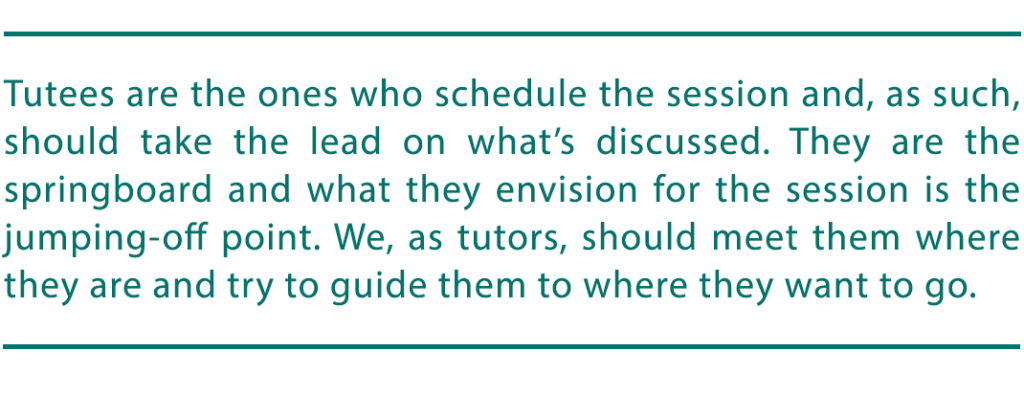
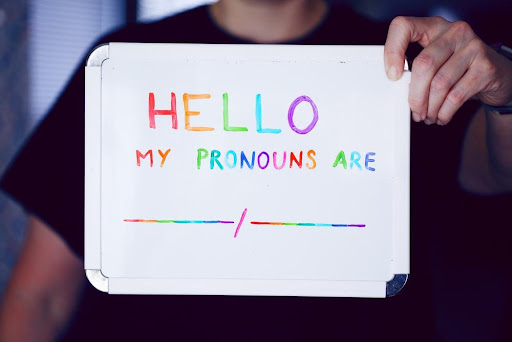
For instance, there was a session in which I met a freshman student who had been assigned a paper on diversity. She said that she didn’t understand what qualified as a “diverse” identity or set of identities. In order to give her a real-life example, I said, “well, I speak Portuguese, Spanish, and English so I’m multilingual—or a polyglot. My entire family was born in Brazil, but I was born in the United States, so I’m a first-generation American. I also identify as a member of the LGBTQ community.” With wide eyes, the tutee replied that, although she had no problem with the LGBTQ community, she had never encountered an “out” gay person before arriving at the university two weeks prior. I explained that I too was once a freshman, and was once fresh to topics within Queer Theory or Gender Studies.
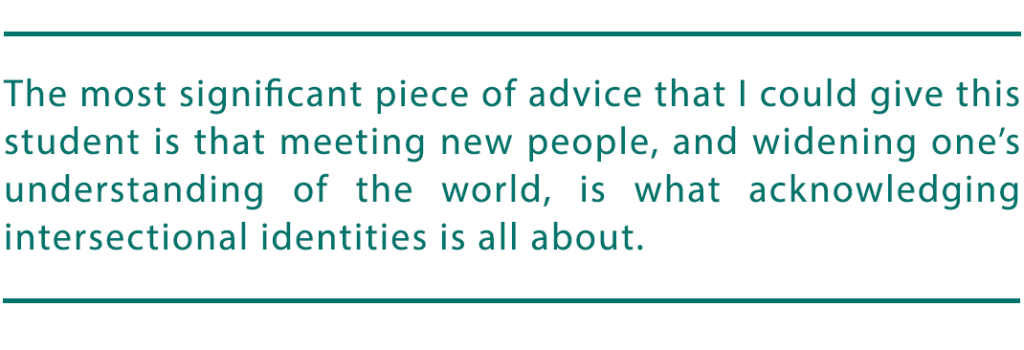
In Denny’s (2010) study, tutors were aided in their provision of guidance for tutees as they found their individual voices. Since many of the tutees that I have met within the WC are tentatively confident undergraduates, I can clearly see a pattern of insecurity in the tutees’ writing skills. This uncertainty can often set the tone for a session, leading the tutee to close themself off preemptively to constructive feedback for fear that their work, or their opinions, will be criticized. Students who have experienced a lack of support outside of the WC might feel even more hesitant to share their work or beliefs within the WC space. Denny, however, proposes that tutors show tutees that “writing and identifying never stand-alone outside a context or community; they are always already constructed in relation to both” (p. 121). This can make itself apparent in the form of mutual disclosure.
I asked the tutee if she was comfortable sharing some of the things that she was and then thinking about some of the things that she was not. She said that she was a white, Christian girl who had a big family. From there, we had an animated conversation about what things existed outside of that realm. She came up with things like “Black,” “only children,” and “Muslim.” This tutee has continued to schedule sessions with me almost every week, or every other week, since that day in 2021. Although this is partly a story of someone who expressed that they hadn’t spent much time pondering diversity or intersectionality, and who hadn’t knowingly engaged with anyone from the LGBTQ community prior to arriving at university, it also points to the idea that if a tutor opens a door by disclosing some parts of themselves, then mutual disclosure becomes all the more likely. As a result, disclosure benefits tutees in the way that they are able to engage in discussions that may help them flourish as writers, as students, and as individual persons.
Obviously, no tutee should ever be pressured into sharing anything about themself or their life. However, brainstorming sessions in particular are most productive around conversation that is centered on self-disclosure. When I was completing a Zoom tutoring session with an individual who had a somewhat pronounced accent, a non-LGBTQ-related conversation emerged in a WC appointment. The student was struggling to understand what I was saying, and I was struggling to understand what she was saying. Instead of placing any of the burden of disclosure on her, I told her that my parents are from Brazil and that, sometimes, in order to have a more rounded out conversation, I like to use analogies and synonyms. I asked her if that was something she’d be interested in during our session. Her face lit up and she informed me that she too was from Brazil and, as a result, we were able to complete the remainder of the session in Portuguese. The student’s willingness to share this common identity with me enabled her to schedule more and more sessions with the WC, and ultimately encouraged her to disclose her home language with other tutors so that they too could attempt to meet her on common ground. This interaction led to the total dismemberment of a barrier that was almost, in this scenario, wholly imagined. However, if I hadn’t disclosed something about myself, the tutee and I may have never discovered our common ground.
Evidently, the question throughout is: how can barriers be broken down between tutors and tutees so that the most meaningful work is completed and the most pleasant connections are created? Unfortunately, common ground is not always assured. When a tutee signs up for a WC session, they are typically hoping that the tutor can help them in some way; therefore, it is up to the tutor to take the next step towards the tutee and, hopefully, meet them halfway. A potential way for a tutor to put their foot in the door in terms of broaching the topic of the LGBTQ community is through the use of pronouns. Every time I tutor on Zoom, I always make sure that my first name and my pronouns are visible to tutees. This makes clients feel more comfortable expressing their own pronouns and preferred names since I, the tutor, have already crafted this imaginary box in which they can input their names or pronouns.

To begin opening spaces for productive tutoring conversations, it could be prudent for tutors to indicate whether or not their tutoring sessions are “safe spaces” for those within particular communities. This could, in turn, lead to a necessary aggregation of LGBTQ students, as outlined by Simpkins and Schwarz (2015) in their Another Word post titled “Queering RAD Research in Writing Center Studies.” A potential application of Simpkins and Schwarz’s theory could be executed in the following scenario: if a tutor is LGBTQ-identified, they could publicize their own sessions as being LGBTQ-friendly. However, could this also create pressure for tutors to essentially “out” themselves at work? What about conversation that built upon “matching” or complementary identities that both tutor and tutee express? Would the idea of crafting complementary tutor/tutee pairings lead to students favoring particular tutors in a WC? Could conversations based on common identities lead to tutor/tutee relationships that might be perceived as too intimate or “friendly”?
In order for mutual disclosure to become a more common occurrence in the WC space, a shift towards affinity-based tutoring is needed. This could, in turn, lead to stronger professional, academic, and educational relationships between tutees and tutors. As Meuse (2016), author of the Another Word post “Tutoring Sessions as Safe Spaces: Affective Writing and the personal Personal Statement,” puts it, “Writing centers on college campuses provide students the opportunity to test drive their writing in a safe space.” At the start of every session with a new tutee, the tutor knows almost nothing about the person whose work they are going to be reviewing or discussing. The fact that these strangers may go on to craft something interesting and unique together should not be overlooked by WC employees and facilitators. Breaking down this divide so that tutors and tutees may collaborate in a safe space can be accomplished by a certain level of mutual disclosure, and this could result in the creation of truly wonderful pieces of writing.
There are many things still to explore in the realm of tutoring and the self-disclosure of identities, such as the ones I claim as my own. There are many potentially uncomfortable conversations to be had with tutors, tutees, and WC employers alike. But these discussions exist because every single tutor and tutee deserves to have their identities—all of their identities—validated during a session. Change cannot occur without conversation, and conversation cannot occur without the willingness to change. So, start by sharing your pronouns with your next tutee and see if this sparks any interesting and important discussions.
Works Cited
Denny, H. (2010). Queering the writing center. The Writing Center Journal, 30(1), 95–124.
Human Rights Campaign Foundation. (2021, December 9). We are here: LGBTQ+ adult population in United States reaches at least 20 million, according to human rights campaign foundation report [Press release].
Meuse, J. (2016, February 9). Tutoring sessions as safe spaces: Affective writing and the personal personal statement. Another Word Blog.
Simpkins, N. (2017, October 2). Writing the body: Writing centers and pronouns. Another Word Blog.
Simpkins, N., & Schwarz, V. (2015, November 9). Queering RAD research in writing center studies. Another Word Blog.
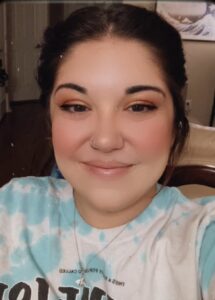
With majors in Japanese and Religious Studies, and minors in Psychology, Women’s and Gender Studies, and International Studies, Julianna has always had a love of learning. Currently procuring a master’s degree in English and a Graduate Certificate in Gender Studies, Julianna has participated in several clubs and organizations in the Charlotte area including QNotes News, the Lambda Theta Alpha Sorority, Charlotte Pride, and UNC Charlotte’s Gender Excellence Learning Community. When not communicating in English, Julianna can be found speaking Portuguese, Spanish, or Japanese while pushing for LGBTQ, gender, and racial equity.


I really loved the way how Julianna Peres is taking an amazing step in helping students to be vocal about their gender and sexuality. I praise such steps as it will help marginalised parts of society to have equality.
It is very important to be vocal about LGBTQ community in the present time they are judged for being a part of LGBTQ community. I recently came across a case in a private Christian University in Seattle where campus administration voted last week to uphold rules that ban the hiring of LBGTQ+ staff from working at the university but students didn’t take it positively and protested against such discrimination.